Giallo
Tenebrae (pt II)
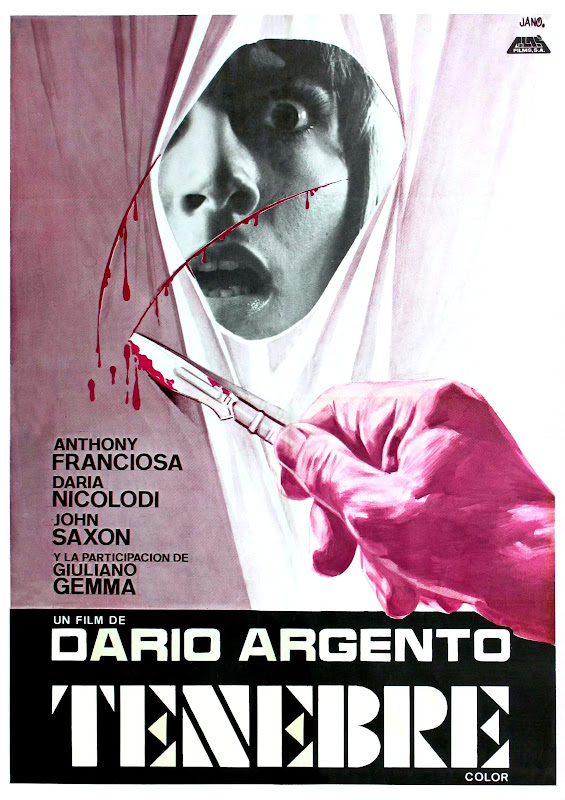
It it, I’d say, quite fitting that Tenebrae, as the first Argento film of the week that I hadn’t previously seen, is the first that I write about with a little more space to reflect on it. And yet… still, I just don’t quite know what to make of it. Was it absolutely stunning? Was it run-of-the-mill? Was it powerful and tense? Or was it just a bit silly?
As I was watching the film - up to about 2/3 of the way through, at least - I was none too taken in by it. It seemed pretty much your typical slasher. As per usual, it was shot beautifully, as per usual the deaths were gleefully brutal but… there really didn’t seem an awful lot that marked it out from the crowded field. It has people being killed. It has ransom-note style anonymous letters. The lead character just happened to be in Italy at the time (this seems to be quite an Argento trope…). Mysterious phone-calls! Someone wearing a mask! The basic plot elements are all just a little too… average.
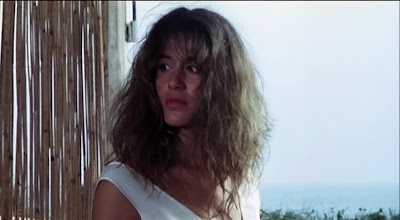
But this is Argento! So perhaps it was unreasonable of me to be concentrating too hard on the plot, after all. Again, however, I found myself feeling disappointed. Although there were a handful of interesting camera angles I felt like something was missing; why wasn’t the camera taking such an excitingly active role as in some of the others? In this, I must now admit, I was just plain wrong. The camera work in Tenebrae is fabulous. It does half of the same things as in his other films but - crucially - you hardly notice it at all. This is surely the best cinematography of all, camera work that grabs you, changes the way you relate to the story and yet remains unobtrusive.
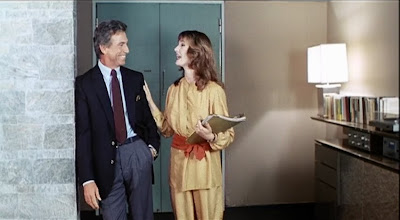
I’m still not sure, though. My appreciation of the film languished at a low-point throughout much of the film, rose unexpectedly to a fever-pitch of wow-that-was-awesome at the end but, with a day’s reflection, has returned to something middling really. It’s not that it’s not an awful lot of fun, it’s simply that it doesn’t cry out in quite the same way as something to be remembered. It doesn’t feel as gloriously unique as some of the others.
I should add, however, that whilst that assessment might be true of the film as a whole, there certainly were a few memorable moments. The extended scene in which a girl is chased by a dog (I really don’t want to give too much away) was Argento at his sublime best. No dialogue, just a building tension (carried wonderfully by Goblin’s score) that makes the scene almost painful to watch but impossible to turn away from. When Tenebrae gets it right, it gets it very right!
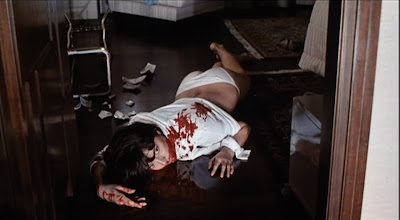
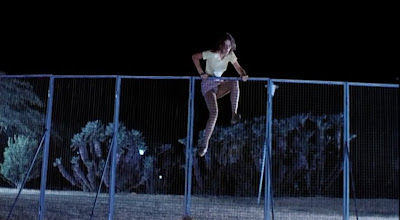
Tenebrae (AKA Tenebre)
Tonight’s film was Tenebrae, the first one that was new to me. Sadly, I’m way too tired to write about it now, so it can wait until the morning.
For now, fans of Justice’s ‘Phantom Parts I & II’ should probably check out the Tenebrae theme tune, contributed by repeated-Argento-collaborators, Goblin.
Justice:
Goblin:
Bird with the Crystal Plumage
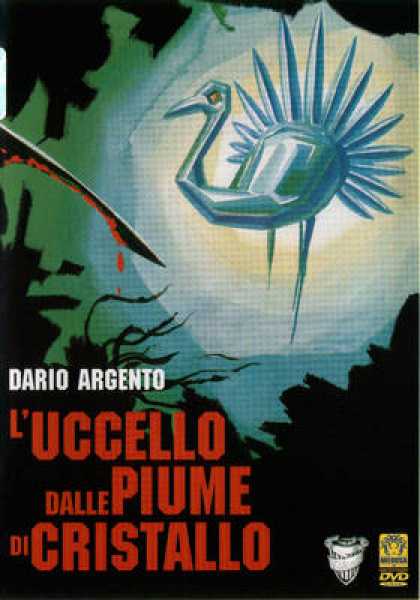
From one to the next!
Tonight’s film was Bird with the Crystal Plumage (L’uccello dalle Piume de Cristallo) which was another that I’d seen before but, once again, was none the worse for it.
My entry for this one will be much shorter. Mostly because I’m much more tired today, but partly also because the film is, in my eyes at least, somewhat less remarkable. It makes a fairly neat comparison against Opera though, mostly because nearly every flaw I found in Opera is corrected here.
Yesterday I pointed out that Opera’s music left something to be desired; here, a certain Mr Ennio Morricone steps in to create a score that bursts with energy when it needs to, broods menacingly at times and jangles its merry way through the film. Similarly, the actual plot - another weak spot in Opera - is phenomenally tight here. Mystery and suspense lurk at every set-piece and in ever shadow. I challenge any viewer not to spend the entire film guessing at who’s responsible for the series of grisly deaths handed out to the poor victims.
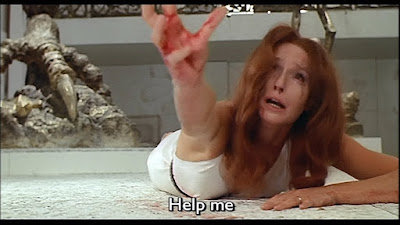
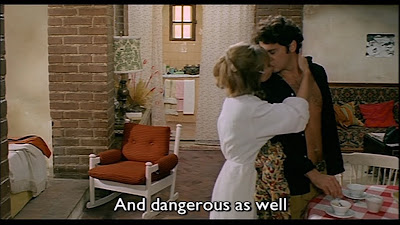
Yet, for all this, it simply doesn’t have the sheer atmosphere that makes Opera so thrilling. The camera, although rarely short of wonderful, doesn’t drag us, biting at our nails, into the story in the same way as yesterday’s film and this is telling of the film as a whole. It’s fascinating, it’s captivating, it’s beautiful but yet it never quite achieves the intensity of Opera.
If I’m damning it with faint praise, I must apologise. Bird with the Crystal Plumage is by no means a bad, or even mediocre film. It’s a great film. It tells a compelling story and it tells it very well indeed. But this is perhaps all it does; it is a brilliant story, but never quite manages to be a brilliant cinematic experience.
Note: It only occurred to me to check the date of this film as an afterthought. This is Argento’s first film as director, some 17 years before he directed Opera and perhaps this explains the points I highlight. This is a much more ’traditional’ film than Opera, a film that obeys more of the normal ‘rules’. In some respects, it’s the better for it, but in terms of a cinematic experience it merely hints at what he was to achieve later.
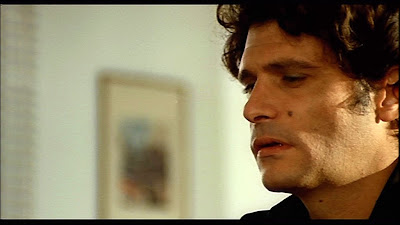
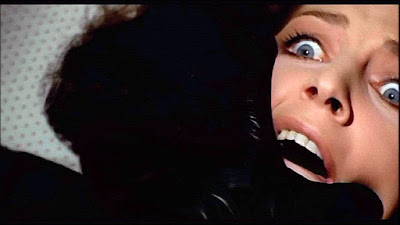
Opera
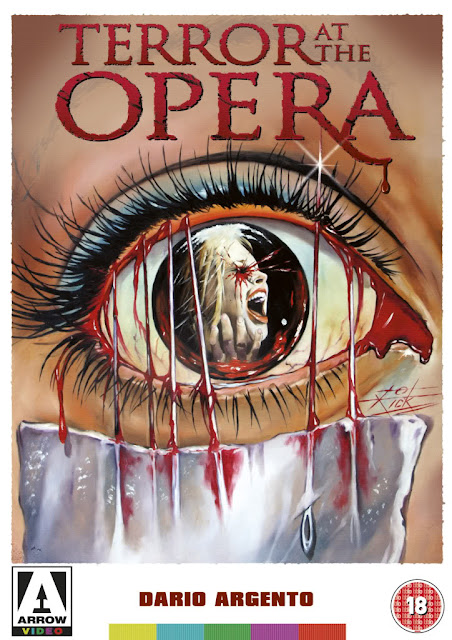
So, part one of Chopping Mall’s Dario Argento Week is his 1987 masterpiece Opera.
This is pitched, as a few of his films are, somewhere between straight up giallo whodunit and a tense psychological horror. With gruesome death scenes. So, you could say, it manages to do a bit of everything that’s awesome about Italian cinema. Except Westerns. There are certainly no cowboys…
The basic premise sees Betty called in at the last minute to perform in the opera of MacBeth. The famous curse of the Scottish play has struck down the intended Lady MacBeth, leaving the role wide open for the young and inexperienced Betty. She steps up to the mark - and gets rave reviews - but from this moment on things really start to go wrong: lights crash to the floor on the opening night, staff members are found dead and then Betty encounters a mysterious masked man…
This guy, it turns out, has quite a sadistic edge to him and happily tied her up, tapes needles to the bottom of her eyes - so she can’t close her eyes in horror, of course - and then precedes to stab her lover in front of her. Through the throat.
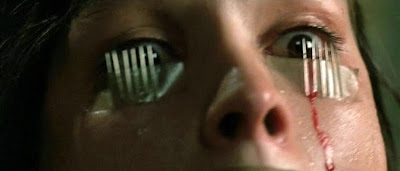
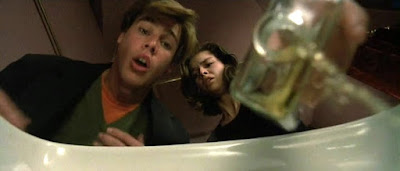
I shan’t elaborate too much on the rest of the plot, as that would spoil the surprise, although perhaps that wouldn’t matter too much. To my mind, the weakest element of Opera is that I really don’t care that much who’s responsible for the murders and - I suspect - Argento doesn’t either. The combination of surprisingly few clues or half-remembered vital details (especially in comparison to some of his other films…) and the sheer indulgence of the murders (lookout for the one with the keyhole…) suggest that this is a film that’s concerned less with who’s doing the crime than er… simply enjoying watching the crime.
Its real strong point however is the astonishingly brilliant camera work. I suspect I’m going to have to spend most of this week hunting out alternative superlatives for the cinematography in Argento’s films, but for now I must say that the visual element of Opera is simply stunning. It’s hard to do it justice in screenshots, simply because this is less about camera angles than about camera movement; Argento’s camera leads us through the film, ducking behind curtains, drawing back ominously, following the heels of characters as they walk. This is the real magic of the film; we never simply watch the action but rather are immersed in it. Argento throws the viewer into the scene, compelling us to watch the grisly details as surely as if it were our eyes that were forced open by needles.
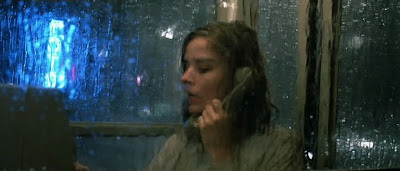
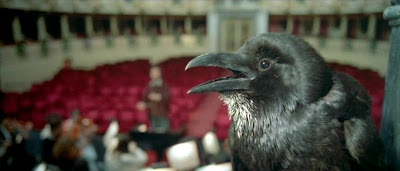
Opera is certainly not everyone’s film, it’s certainly not simply a murder mystery and it’s certainly not the best constructed story you’ll watch/read/encounter. What it is, however, is utterly compelling viewing, visually astonishing and an awful lot of fun.
The only remaining points to note are the brilliance of the crows - surely the most threatening birds in cinema after those of The Birds - and, less brilliantly, the appalling choices made in the soundtrack. With brilliant excerpts of opera music, it seems such a shame to throw in the odd chunk of metal-ish guitar rock, which in most cases simply kills the atmosphere. It’s a far cry, say, from the dipping-with-tension(-and-blood) soundtrack to Suspiria….
Poster Hunt #10 - Suspiria & Giallo
Whilst most of the posters I’ve selected for Poster Hunt have been classic style, painted scenes, I thought that this time I’d go for a more modern, minimal look: clean lines and bold block colours.
So here we have two posters, the first for Dario Argento’s Suspiria (a truly fantastic film, I recommend it highly) and the second for his much more recent Giallo (which I haven’t seen and which received very mixed reviews)
Regardless of the quality of the films though, the posters are certainly both gorgeous.

